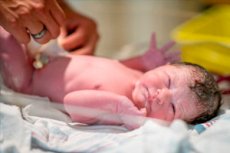New publications
Study shows water birth is safe
Last reviewed: 02.07.2025

All iLive content is medically reviewed or fact checked to ensure as much factual accuracy as possible.
We have strict sourcing guidelines and only link to reputable media sites, academic research institutions and, whenever possible, medically peer reviewed studies. Note that the numbers in parentheses ([1], [2], etc.) are clickable links to these studies.
If you feel that any of our content is inaccurate, out-of-date, or otherwise questionable, please select it and press Ctrl + Enter.

New research confirms that for women with uncomplicated pregnancies, water birth is as safe as leaving the water before birth. The study, "Maternal and neonatal outcomes in vaginal births occurring in or out of water after intrapartum water immersion: the POOL cohort study," was published in BJOG: The International Journal of Obstetrics and Gynecology.
Researchers studied the birth experiences of more than 87,000 women with uncomplicated pregnancies who used water immersion during labor for comfort and pain relief. The study aimed to find out whether staying in the water to give birth was as safe for mothers and their babies as leaving the water before giving birth.
Professor Julia Sanders, professor of clinical midwifery at Cardiff University, who led the research team, said: "Around 60,000 women use a birthing pool or bath each year in the UK to ease the pain of labour, but some midwives and doctors were concerned that water births could carry extra risks. There were reports of babies becoming seriously ill or even dying after water births, and mothers were more likely to suffer severe tears or excessive blood loss. So a large study was needed to look at the safety of water births in the UK.
"We wanted to establish whether water births with NHS midwives are as safe as births outside of water for women and their babies, with a low risk of complications," says Julia Sanders, professor of clinical obstetrics and gynaecology.
The POOL study, led by Cardiff University School of Public Health and the Centre for Clinical Trials Research, examined NHS records of 87,040 women using a pool during birth between 2015 and 2022 across 26 NHS trusts in England and Wales. The researchers looked at the rate of severe tears suffered by women, how often babies needed antibiotics or breathing help on the neonatal unit, and the rate of baby deaths.
"The main aim of our study was to answer a question often asked by women using birthing pools or tubs during labour - obstetricians often ask mothers whether they should stay in or out of the water to give birth if the labour continues without problems.
"In the women we studied, some came out of the pool to get additional medical care or additional pain relief. Most of the women who came out of the pool to get additional medical care were first-time mothers - 1 in 3 first-time mothers came out of the pool to get additional medical care, compared with 1 in 20 women who had already given birth," Sanders says.
Overall, the researchers found that about half of all women who used a pool during labor gave birth in water.
The researchers found that about 1 in 20 first-time mothers and 1 in 100 mothers giving birth for the second, third or fourth time had a severe tear. They also found that about 3 in 100 babies needed antibiotics or breathing help in the neonatal unit after birth, and infant deaths were rare. But the rates of these and other complications were similar for births in and out of water.
Their data showed that the cesarean section rate was low, less than 6% for first-time mothers and less than 1% for second, third, or fourth-time mothers.
"Given that 10% of women use water immersion for pain relief in labour, the results of this study will impact thousands of women a year in the UK and many more around the world where water immersion during labour is common practice," says Professor Peter Brocklehurst.
Professor Chris Gale, consultant neonatologist at Chelsea and Westminster Hospitals Foundation Trust in London, said: "Many paediatricians and neonatologists worry that water births may carry additional risks for babies, but the study found strong evidence that for women with uncomplicated pregnancies this is not the case."
Rachel Placzynski, a parent representative on the study team and a former antenatal teacher, said: "It is also reassuring to see that midwives are noticing potential problems during labour and are encouraging these women to leave the pool so that mothers and their babies can receive appropriate monitoring and care."
"Our research has scientifically confirmed that water births do not carry any increased risks for mothers and babies. By examining NHS data from more than 87,000 births in England and Wales, we have been able to provide information that can support mothers and midwives in their decision-making during labour," added Professor Sanders.
